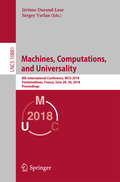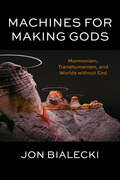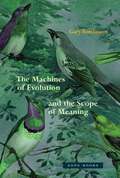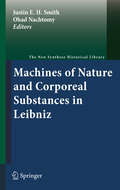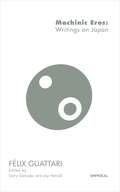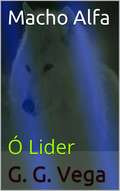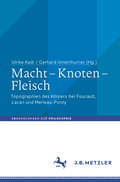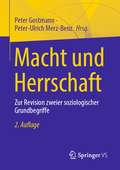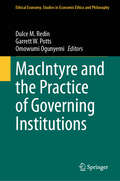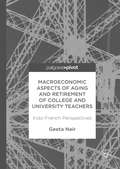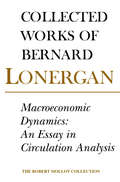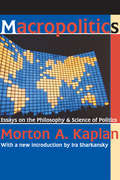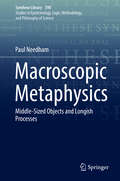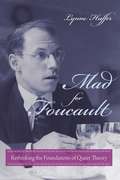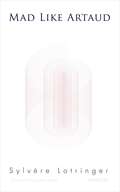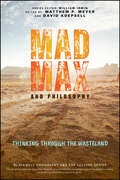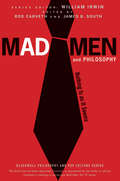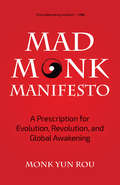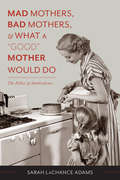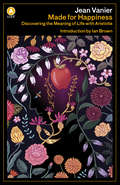- Table View
- List View
Machines, Computations, and Universality: 8th International Conference, MCU 2018, Fontainebleau, France, June 28–30, 2018, Proceedings (Lecture Notes in Computer Science #10881)
by Jérôme Durand-Lose Sergey VerlanThis book constitutes the refereed proceedings of the 8th International Conference on Machines, Computations, and Universality, MCU 2018, held in Fontainebleau, France, in June 2018. The 9 revised full papers presented together with 5 invited talks were carefully reviewed and selected from numerous submissions. MCU explores computation in the setting of various discrete models (Turing machines, register machines, cellular automata, tile assembly systems, rewriting systems, molecular computing models, neural models, concurrent systems, etc.) and analog and hybrid models (BSS machines, infinite time cellular automata, real machines, quantum computing, etc.).
Machines for Making Gods: Mormonism, Transhumanism, and Worlds without End
by Jon BialeckiThe Mormon faith may seem so different from aspirations to transcend the human through technological means that it is hard to imagine how these two concerns could even exist alongside one another, let alone serve together as the joint impetus for a social movement. Machines for Making Gods investigates the tensions between science and religion through which an imaginative group of young Mormons and ex-Mormons have found new ways of understanding the world.The Mormon Transhumanist Association (MTA) believes that God intended humanity to achieve Mormonism’s promise of theosis through imminent technological advances. Drawing on a nineteenth-century Mormon tradition of religious speculation to reimagine Mormon eschatological hopes as near-future technological possibilities, they envision such current and possible advances as cryonic preservation, computer simulation, and quantum archeology as paving the way for the resurrection of the dead, the creation of worlds without end, and promise of undergoing theosis—of becoming a god. Addressing the role of speculation in the anthropology of religion, Machines for Making Gods undoes debates about secular transhumanism’s relation to religion by highlighting the differences an explicitly religious transhumanism makes.Charting the conflicts and resonances between secular transhumanism and Mormonism, Bialecki shows how religious speculation has opened up imaginative horizons to give birth to new forms of Mormonism, including a particular progressive branch of the faith and even such formations as queer polygamy. The book also reveals how the MTA’s speculative account of God and technology together has helped to forestall some of the social pressure that comes with apostasy in much of the Mormon Intermountain West.A fascinating ethnography of a group with much to say about crucial junctures of modern culture, Machines for Making Gods illustrates how the scientific imagination can be better understood when viewed through anthropological accounts of myth.
The Machines of Evolution and the Scope of Meaning
by Gary TomlinsonA groundbreaking account of the origin and place of meaning in the earthly biosphereWhat is meaning? How does it arise? Where is it found in the world? In recent years, philosophers and scientists have answered these questions in different ways. Some see meaning as a uniquely human achievement, others extend it to trees, microbes, and even to the bonding of DNA and RNA molecules. In this groundbreaking book, Gary Tomlinson defines a middle path. Combining emergent thinking about evolution, new research on animal behaviors, and theories of information and signs, he tracks meaning far out into the animal world. At the same time he discerns limits to its scope and identifies innumerable life forms, including many animals and all other organisms, that make no meanings at all.Tomlinson’s map of meaning starts from signs, the fundamental units of reference or aboutness. Where signs are at work they shape meaning-laden lifeways, offering possibilities for distinctive organism/niche interactions and sometimes leading to technology and culture. The emergence of meaning does not, however, monopolize complexity in the living world. Countless organisms generate awe-inspiring behavioral intricacies without meaning. The Machines of Evolution and the Scope of Meaning offers a revaluation of both meaning and meaninglessness, uncovering a foundational difference in animal solutions to the hard problem of life.
Machines of Nature and Corporeal Substances in Leibniz
by Ohad Nachtomy Justin E. SmithIn recent decades, there has been much scholarly controversy as to the basic ontological commitments of the philosopher Gottfried Wilhelm Leibniz (1646-1716). The old picture of his thought as strictly idealistic, or committed to the ultimate reduction of bodies to the activity of mind, has come under attack, but Leibniz's precise conceptualization of bodies, and the role they play in his system as a whole, is still the subject of much controversy. One thing that has become clear is that in order to understand the nature of body in Leibniz, and the role body plays in his philosophy, it is crucial to pay attention to the related concepts of organism and of corporeal substance, the former being Leibniz's account of the structure of living bodies (which turn out, for him, to be the only sort of bodies there are), and the latter being an inheritance from the Aristotelian hylomorphic tradition which Leibniz appropriates for his own ends. This volume brings together papers from many of the leading scholars of Leibniz's thought, all of which deal with the cluster of questions surrounding Leibniz's philosophy of body.
Machines of the Mind: Personification in Medieval Literature
by Katharine BreenIn Machines of the Mind, Katharine Breen proposes that medieval personifications should be understood neither as failed novelistic characters nor as instruments of heavy-handed didacticism. She argues that personifications are instead powerful tools for thought that help us to remember and manipulate complex ideas, testing them against existing moral and political paradigms. Specifically, different types of medieval personification should be seen as corresponding to positions in the rich and nuanced medieval debate over universals. Breen identifies three different types of personification—Platonic, Aristotelian, and Prudentian—that gave medieval writers a surprisingly varied spectrum with which to paint their characters. Through a series of new readings of major authors and works, from Plato to Piers Plowman, Breen illuminates how medieval personifications embody the full range of positions between philosophical realism and nominalism, varying according to the convictions of individual authors and the purposes of individual works. Recalling Gregory the Great’s reference to machinae mentis (machines of the mind), Breen demonstrates that medieval writers applied personification with utility and subtlety, employing methods of personification as tools that serve different functions. Machines of the Mind offers insight for medievalists working at the crossroads of religion, philosophy, and literature, as well as for scholars interested in literary character-building and gendered relationships among characters, readers, and texts beyond the Middle Ages.
Machines of the Mind: Personification in Medieval Literature
by Katharine BreenIn Machines of the Mind, Katharine Breen proposes that medieval personifications should be understood neither as failed novelistic characters nor as instruments of heavy-handed didacticism. She argues that personifications are instead powerful tools for thought that help us to remember and manipulate complex ideas, testing them against existing moral and political paradigms. Specifically, different types of medieval personification should be seen as corresponding to positions in the rich and nuanced medieval debate over universals. Breen identifies three different types of personification—Platonic, Aristotelian, and Prudentian—that gave medieval writers a surprisingly varied spectrum with which to paint their characters. Through a series of new readings of major authors and works, from Plato to Piers Plowman, Breen illuminates how medieval personifications embody the full range of positions between philosophical realism and nominalism, varying according to the convictions of individual authors and the purposes of individual works. Recalling Gregory the Great’s reference to machinae mentis (machines of the mind), Breen demonstrates that medieval writers applied personification with utility and subtlety, employing methods of personification as tools that serve different functions. Machines of the Mind offers insight for medievalists working at the crossroads of religion, philosophy, and literature, as well as for scholars interested in literary character-building and gendered relationships among characters, readers, and texts beyond the Middle Ages.
Machines of the Mind: Personification in Medieval Literature
by Katharine BreenIn Machines of the Mind, Katharine Breen proposes that medieval personifications should be understood neither as failed novelistic characters nor as instruments of heavy-handed didacticism. She argues that personifications are instead powerful tools for thought that help us to remember and manipulate complex ideas, testing them against existing moral and political paradigms. Specifically, different types of medieval personification should be seen as corresponding to positions in the rich and nuanced medieval debate over universals. Breen identifies three different types of personification—Platonic, Aristotelian, and Prudentian—that gave medieval writers a surprisingly varied spectrum with which to paint their characters. Through a series of new readings of major authors and works, from Plato to Piers Plowman, Breen illuminates how medieval personifications embody the full range of positions between philosophical realism and nominalism, varying according to the convictions of individual authors and the purposes of individual works. Recalling Gregory the Great’s reference to machinae mentis (machines of the mind), Breen demonstrates that medieval writers applied personification with utility and subtlety, employing methods of personification as tools that serve different functions. Machines of the Mind offers insight for medievalists working at the crossroads of religion, philosophy, and literature, as well as for scholars interested in literary character-building and gendered relationships among characters, readers, and texts beyond the Middle Ages.
Machinic Eros: Writings on Japan (Univocal)
by Félix GuattariThe French philosopher Félix Guattari frequently visited Japan during the 1980s and organized exchanges between French and Japanese artists and intellectuals. His immersion into the &“machinic eros&” of Japanese culture put him into contact with media theorists such as Tetsuo Kogawa and activists within the mini-FM community (Radio Home Run), documentary filmmakers (Mitsuo Sato), photographers (Keiichi Tahara), novelists (Kobo Abe), internationally recognized architects (Shin Takamatsu), and dancers (Min Tanaka). From pachinko parlors to high-rise highways, alongside corporate suits and among alt-culture comrades, Guattari put himself into the thick of Japanese becomings during a period in which the bubble economy continued to mutate. This collection of essays, interviews, and longer meditations shows a radical thinker exploring the architectural environment of Japan&’s &“machinic eros.&”
Macho Alfa
by Guido Galeano Vega Eunice T AndreLivro que trata de aspectos sociais e culturais de líderes em grupos animais e humanos. Macho Alfa Este conceito é mais bem aplicado no âmbito da natureza ou no sistema biológico animal. Nas sociedades modernas, é aplicado também para definir certo tipo de pessoas, que se caracterizam por sua capacidade de liderança. Como o conceito tem uma relação mais direta com o mundo animal, e mais ainda vinculado a certas espécies de predadores, implacáveis, de extrema eficiência no processo de caçada grupal, atividade motivada para garantir ou melhorar a possibilidade de sobrevivência em contextos de natureza selvagem, como é o caso dos lobos. Ele tem sido aplicado também nos grupos humanos com um estilo de vida de características similares.
Macht - Knoten - Fleisch: Topographien des Körpers bei Foucault, Lacan und Merleau-Ponty (Abhandlungen zur Philosophie)
by Ulrike Kadi Gerhard UnterthurnerDer "Macht - Knoten - Fleisch. Topographien des Körpers bei Foucault, Lacan und Merleau Ponty" greift eine Reihe von Begriffen und Konzepten der drei Referenzautoren heraus, die für ein zeitgemäßes Verständnis des Körpers entscheidend sind. Bei Foucault wird der Körper von seiner Verflechtung mit Macht und Wissen her thematisiert. Die Knoten, die Körper machen und Körper-Raum-Verhältnisse vorstellen, sind für Lacan relevant. Und Merleau-Ponty bietet mit Stichworten wie der leiblichen Praxis, der Zwischenleiblichkeit oder des „Fleisches des Welt“ weitere theoretische Facetten, die es zu berücksichtigen gilt. Der Band versteht sich nicht nur als ein Beitrag zu einem Dialog über den Körper zwischen Genealogie, Psychoanalyse und Phänomenologie. Sondern der Band ist als Brückenkopf für einen Wissenstransfer zu anderen Körperwissenschaften konzipiert. Er richtet sich daher an Lehrende, Forschende und Lernende aus Disziplinen, die sich mit dem Körper beschäftigen. Gleichermaßen soll er interessierten Laien ein Werkzeug zur Einordnung und Bearbeitung von neuen Phänomenen in, an und mit dem Körper an die Hand geben.
Macht und Herrschaft: Zur Revision zweier soziologischer Grundbegriffe
by Peter Gostmann Peter-Ulrich Merz-BenzDas Buch befasst sich mit Kernbegriffen der Sozialwissenschaften: Macht und Herrschaft. Mit Beiträgen von Gerhard Wagner, Guy Oakes, Hubert Treiber, Peter Gostmann, Peter-Ulrich Merz-Benz, Dirk Tänzler und Stephen Turner.
Macht und Magie: Tiefenhermeneutische Rekonstruktion nationalsozialistischer, neokonservativer und rechtspopulistischer Inszenierungen in Deutschland (Kritische Sozialpsychologie)
by Hans-Dieter KönigDieses Buch beantwortet die sozialpsychologische Frage, wie politische Akteure und Akteurinnen die Mehrheit der Deutschen für partikulare Machtinteressen eingenommen haben. Die tiefenhermeneutische Analyse zeigt, wie politische Reden ihre Wirkung durch eine Magie der Worte und durch magische Inszenierungen entfalten.
MacIntyre and the Practice of Governing Institutions (Ethical Economy #1)
by Dulce M. Redín Garrett W. Potts Omowumi OgunyemiThis volume offers a cross-disciplinary exploration of Alasdair MacIntyre's provocative approach to governance, drawing on insights from philosophy, economics, sociology, business ethics, and organizational studies. The chapters explore how MacIntyre’s theory is applied to diverse institutional contexts, including education, medicine, and technology, addressing contemporary challenges in governance and ethical decision-making. Bringing together well-known scholars from the 16th Annual Conference of the International Society for MacIntyrean Enquiry (ISME) at the University of Navarra, this book critically examines the role of governing institutions in shaping practices and traditions. It highlights MacIntyre’s distinction between practices and institutions, addressing how these concepts influence ethical governance, leadership, and community-building in today's complex societal landscapes. Contributors explore key themes such as the development of virtues within institutions, the ethical challenges of artificial intelligence, the moral foundations of education, and the governance of professions like medicine and land management. This volume also engages with contemporary issues, offering practical insights for fostering ethical decision-making and community participation in an increasingly technocratic world. MacIntyre and the Practice of Governing Institutions is an essential resource for scholars of political philosophy, ethics, and governance, as well as for practitioners looking to navigate the ethical challenges posed by modern institutions. By examining how MacIntyre's thought applies to real-world issues, this book provides both theoretical depth and practical strategies for promoting human flourishing through virtuous governance.
Macroeconomic Aspects of Aging and Retirement of College and University Teachers: Indo-French Perspectives
by Geeta NairThis book explores the universal and highly topical issues of ageing and retirement. It places a particular focus on the macroeconomic aspects of the ageing and retirement of college and university teachers, through a case study of teachers and professors in France and India. While the ageing of the population and the financing of the pension system are notoriously pressing issues in Western nations such as France, it has previously not been acknowledged that these issues are also critical to the development trajectory of emerging countries such as India. The book also highlights the importance of pensions for welfare, well-being and stability in all categories of workers, including workers in the informal sector and private companies devoid of pension schemes, where jobs are largely irregular and temporary in nature. It will be of great interest to researchers in the fields of comparative education, sociology and economics.
Macroeconomic Dynamics: An Essay in Circulation Analysis, Volume 15
by Bernard Lonergan Charles Hefling Jr. Frederick Lawrence Patrick ByrneFew theologians in history have matched Bernard Lonergan's range of learning. Fewer still have written on the "dismal science" of economics. Rooted so solidly in the concerns of this world, economics is not a discipline we associate with the more rarified pursuit of theology. In this long-awaited volume, Lonergan demonstrates the short-sightedness of this view. This companion volume to For A New Political Economy (Collected Works of Bernard Lonergan, Volume 21) continues the work of bringing together the various elements of Lonergan's economic thought. His economic writings span forty years and represent one of the most important intellectual achievements of the twentieth century. They have previously been inaccessible outside of the Lonergan research community as the majority of them have not been formally published, and exist only as a group of unfinished essays and material for courses on economics taught by Lonergan. Lonergan's economic ideas track a different line of thought from that taken by contemporary economists. Macroeconomic Dynamics: An Essay in Circulation Analysis represents the economic thought of Lonergan at the end of his career. His analysis, while taking a fresh look at fundamental variables, breaks from centralist theory and practice towards a radically democratic perspective on surplus income and non-political control, and explores more fully the ideas introduced in For a New Political Economy. This work will be read not only by economists but also by liberation theologians, political theologians, and others inside and outside of religious organizations interested in social justice issues and alternative approaches to economics.
Macropolitics: Essays on the Philosophy and Science of Politics
by Friedrich MeineckeA selection of essays by a pioneer in the application of systems theory to political analysis, Macropolitics develops the author's concern with the philosophical foundations of political science, and with the extension of philosophical principles into the realm of empirical analysis. For this volume, Kaplan has written a long essay on the philosophical foundations of his work, which constitutes one of his most important statements. He develops and explains within a philosophical context his contention that values can be treated in an empirically meaningful fashion. Organized to expand or illustrate the major points raised in this introduction, the essays that follow deal with such topics as the nature and utility of systems theory, empirical treatment of historical explanations, the systemic and psychological foundations of values, and empirical applications of systems theory in analyzing international political systems. Enlarging the dialogue between conflicting viewpoints, Kaplan exposes the common roots of Western scientific thought and Marxist philosophy, emphasizing that both status quo and revolutionary philosophies are one-sided. In his new introduction, Ira Sharkansky sees this as a truly groundbreaking work: "thanks in considerable part to the contributions of Professor Kaplan, international relations theory is a major component of political sciencei?1/2a milestone on our quest for understanding i?1/2 a distinguished part of the ongoing record." When the book first appeared, William Welch in the American Political Science Review called it "excellent: his weighing against the evidence of competing hypotheses is truly exemplary i?1/2 thorough, careful, fair-minded."
Macroscopic Metaphysics: Middle-Sized Objects and Longish Processes (Synthese Library #390)
by Paul NeedhamThis book is about our ordinary concept of matter in the form of enduring continuants and the processes in which they are involved in the macroscopic realm. It emphasises what science rather than philosophical intuition tells us about the world, and chemistry rather than the physics that is more usually encountered in philosophical discussions. The central chapters dealing with the nature of matter pursue key steps in the historical development of scientific conceptions of chemical substance. Like many contemporary discussions of material objects, it relies heavily on mereology. The classical principles are applied to the mereological structure of regions of space, intervals of time, processes and quantities of matter. Quantities of matter, which don't gain or lose parts over time, are distinguished from individuals, which are typically constituted of different quantities of matter at different times. The proper treatment of the temporal aspect of the features of material objects is a central issue in this book, which is addressed by investigating the conditions governing the application of predicates relating time and other entities. Of particular interest here are relations between quantities of matter and times expressing substance kind, phase and mixture. Modal aspects of these features are taken up in the final chapter.
Mad for Foucault: Rethinking the Foundations of Queer Theory (Gender and Culture Series)
by Lynne HufferMichel Foucault was the first to embed the roots of human sexuality in discipline and biopolitics, therefore revolutionizing our conception of sex and its relationship to society, economics, and culture. Yet over the past two decades, scholars have limited themselves to the study of Foucault's History of Sexuality, volume 1 paying lesser attention to his equally explosive History of Madness. In this earlier volume, Foucault recasts Western rationalism as a project that both produces and represses sexual deviants, calling out the complicity of modern science and the exclusionary nature of family morality. By reclaiming these deft moves, Lynne Huffer teases out exciting new strands of Foucauldian thought. She then revisits the theorist's ethical work in light of these discoveries, divining an ethics of eros that sees sexuality as a lived experience we are repeatedly called on to remember. Throughout her study, Huffer weaves her own experiences together with Foucault's, sampling from unpublished interviews and other archived materials in order to intimately rework the problem of sexuality as a product of reason.
Mad Like Artaud (Univocal)
by Sylvère LotringerThose who are mad like Antonin Artaud, are they just as mad as he was? Madness, like the plague, is contagious, and everyone, from his psychiatrists to his disciples, family, and critics, everyone who gets close to Artaud, seems to participate in his delirium. Sylvère Lotringer explores various embodiments of this shared delirium through what Artaud called &“mental dramas&”—a series of confrontations with his witnesses or &“persecutors&” where we uncover the raw delirium at work, even in Lotringer himself. Mad Like Artaud does not intend to add one more layer of commentary to the bitter controversies that have been surrounding the cursed poet&’s work since his death in 1948, nor does it take sides among the different camps who are still haggling over his corpse. This book speaks of the site where &“madness&” itself is simmering.
Mad Max and Philosophy: Thinking Through the Wasteland (The Blackwell Philosophy and Pop Culture Series)
by William IrwinExplore the philosophy at the core of the apocalyptic future of Mad Max Beneath the stylized violence and thrilling car crashes, the Mad Max films consider universal questions about the nature of human life, order and anarchy, justice and moral responsibility, society and technology, and ultimately, human redemption. In Mad Max and Philosophy, a diverse team of political scientists, historians, and philosophers investigates the underlying themes of the blockbuster movie franchise, following Max as he attempts to rebuild himself and the world around him. Requiring no background in philosophy, this engaging and highly readable book guides you through the barren wastelands of a post-apocalyptic future as you explore ethics and politics in The Wasteland, the importance of costumes and music, humankind's relationship with nature, commerce, gender, religion, madness, and much more. Covers all of George Miller's Mad Max films, including Mad Max: Fury Road Discusses connections between Mad Max and Nietzsche, Malthus, Mill, Foucault, Sartre, and other major philosophers Follows Max's journey from policeman and family man to lost soul in search of redemption Examines the future of technology and possible impacts on society, the environment, and access to natural resources Delves into feminist themes of Mad Max, such as the reversal of heroic gender roles in Fury Road and relationships between power and procreationPart of the bestselling Blackwell Philosophy and Pop Culture series, Mad Max and Philosophy: Thinking Through the Wasteland is a must-read for anyone wanting to philosophically engage with Max, Furiosa, and their dystopian world.
Mad Men and Philosophy: Nothing Is as It Seems (The Blackwell Philosophy and Pop Culture Series #28)
by William IrwinA look at the philosophical underpinnings of the hit TV show, Mad Men With its swirling cigarette smoke, martini lunches, skinny ties, and tight pencil skirts, Mad Men is unquestionably one of the most stylish, sexy, and irresistible shows on television. But the series becomes even more absorbing once you dig deeper into its portrayal of the changing social and political mores of 1960s America and explore the philosophical complexities of its key characters and themes. From Socrates, Plato, and Aristotle to John Kenneth Galbraith, Milton Friedman, and Ayn Rand, Mad Men and Philosophy brings the thinking of some of history's most powerful minds to bear on the world of Don Draper and the Sterling Cooper ad agency. You'll gain insights into a host of compelling Mad Men questions and issues, including happiness, freedom, authenticity, feminism, Don Draper's identity, and more. Takes an unprecedented look at the philosophical issues and themes behind AMC's Emmy Award-winning show, Mad Men Explores issues ranging from identity to authenticity to feminism, and more Offers new insights on your favorite Mad Men characters, themes, and storylines Mad Men and Philosophy will give Mad Men fans everywhere something new to talk about around the water cooler.
Mad Monk Manifesto: A Prescription for Evolution, Revolution, and Global Awakening
by Yun RouWinner of Both Gold & Silver 2018 Nautilus Book Award and #1 New Release in Taoism and Tao Te ChingChange Yourself, Change The WorldFind answers. It’s easy to get outraged by world events, frustrated by our own personal battles, and disenfranchised from government and leadership. Born of moral indignation, informed by decades of study, and seasoned by a life of devoted self-cultivation, Monk Yun Rou’s Mad Monk Manifesto has answers, personal prescriptions, and calls to social and political action in one powerful book.Change the world by changing ourselves. Based on ancient Chinese wisdom such as Lao Tzu’s Tao Te Ching, Mad Monk Manifesto is part tour guide to consciousness, part recipe for personal development, part prescription for environmental salvation, and part handbook for social change.Wise advice for the awakened life. As ripples move away from a stone dropped into a pond, Mad Monk Manifesto begins with our personal lives, discussing diet, exercise, meditation, and mind/body practice. Then it expands to our public environment, describing what we can do to improve our community, government, and the world. Full of everything from advice for a healthy, conscious lifestyle to actions we can take to enhance the lives of friends, family, coworkers, and community members; Mad Monk Manifesto highlights spirituality and service. In addition, Monk Yun Rou encourages everyone to engage in the nature that surrounds them, showing how environmentalism can take place in daily life.Mad Monk Manifesto is precisely what the world needs at a time of unprecedented environmental disasters, international instability, and divisive and unreliable leadership. After reading this book, you will learn:How to relax, rectify, and rebalance lifeHow to bolster the community and deepen cultureHow to effect positive change in commerce, government, power, and the environmentMad Monk Manifesto is for readers of Alan Watts, Eckhart Tolle, and Change Your Thoughts—Change Your Life by Dr. Wayne W. Dyer.
Mad Mothers, Bad Mothers, and What a "Good" Mother Would Do
by Sarah Lachance AdamsWhen a mother kills her child, we call her a bad mother, but, as this book shows, even mothers who intend to do their children harm are not easily categorized as "mad" or "bad." Maternal love is a complex emotion rich with contradictory impulses and desires, and motherhood is a conflicted state in which women constantly renegotiate the needs mother and child, the self and the other. Applying care ethics philosophy and the work of Emmanuel Levinas, Maurice Merleau-Ponty, and Simone de Beauvoir to real-world experiences of motherhood, Sarah LaChance Adams throws the inherent tensions of motherhood into sharp relief, drawing a more nuanced portrait of the mother and child relationship than previously conceived. The maternal example is particularly instructive for ethical theory, highlighting the dynamics of human interdependence while also affirming separate interests. LaChance Adams particularly focuses on maternal ambivalence and its morally productive role in reinforcing the divergence between oneself and others, helping to recognize the particularities of situation, and negotiating the difference between one's own needs and the desires of others. She ultimately argues maternal filicide is a social problem requiring a collective solution that ethical philosophy and philosophies of care can inform.
Mad Mothers, Bad Mothers, and What a "Good" Mother Would Do: The Ethics of Ambivalence
by Sarah LaChance AdamsWhen a mother kills her child, we call her a bad mother, but, as this book shows, even mothers who intend to do their children harm are not easily categorized as "mad" or "bad." Maternal love is a complex emotion rich with contradictory impulses and desires, and motherhood is a conflicted state in which women constantly renegotiate the needs mother and child, the self and the other. Applying care ethics philosophy and the work of Emmanuel Levinas, Maurice Merleau-Ponty, and Simone de Beauvoir to real-world experiences of motherhood, Sarah LaChance Adams throws the inherent tensions of motherhood into sharp relief, drawing a more nuanced portrait of the mother and child relationship than previously conceived. The maternal example is particularly instructive for ethical theory, highlighting the dynamics of human interdependence while also affirming separate interests. LaChance Adams particularly focuses on maternal ambivalence and its morally productive role in reinforcing the divergence between oneself and others, helping to recognize the particularities of situation, and negotiating the difference between one's own needs and the desires of others. She ultimately argues maternal filicide is a social problem requiring a collective solution that ethical philosophy and philosophies of care can inform.
Made for Happiness: Discovering the Meaning of Life with Aristotle
by Jean VanierThis bestselling work is an uplifting and practical look at philosophy and how it can be applied in our everyday lives from the author of the international bestseller, Becoming Human.In Made for Happiness, Jean Vanier examines the basis for modern moral philosophy and its role in our lives today. Having discovered through his work with the intellectually disabled the degree to which our society is divided, and our values misplaced, Vanier invites us to read with fresh eyes theories of happiness written 2,400 years ago.The book follows the links between psychology, spirituality, and morality: psychology helps us face our fears and limitations; spirituality gives us strength; and morality helps us to choose the best actions, those that will make us happier, and thus more human. The combination of these paths to knowledge and wisdom gives meaning to our lives and allows us to make the best use of our freedom on our way to happiness.
